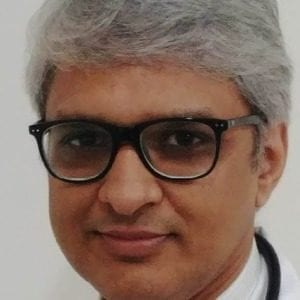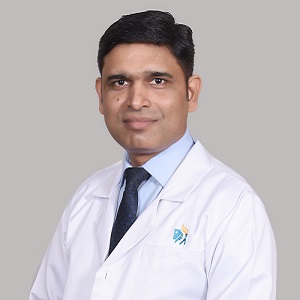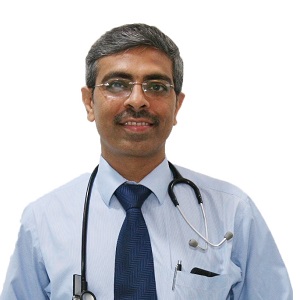Best Doctors in India for Alcoholic Hepatitis Treatment
- Liver Transplant Surgeon & HPB Surgeon, Gurugram, India
- Over 20 years’ experience
Profile Highlights:
- Dr. Sanjay Goja is known for being the first Indian surgeon to perform Robotic Hepatectomy.
- Dr. Sanjay Goja has performed over 1000 liver transplant surgeries, as well as over 500 hepatobiliary procedures as a primary surgeon.
- He is an active member of various organizations such as the Association of Surgeons of India, American College of Surgeons, Indian Association of Gastrointestinal Endo Surgeons, International Liver Transplant Society, etc.
- Surgical Oncologist, Gurugram, India
- Over 10 years’ experience
Profile Highlights:
- Dr. Shilpi Sharma is a highly experienced surgeon and oncologist who has previously worked in prestigious institutions such as Tata Memorial Hospital, and National Cancer Institute.
- Throughout her career, she has conducted various high-quality research in the field of head and neck cancers. Dr. Shilpi Sharma has also been part of various randomized and nonrandomized trials and has also been involved in clinical and translational research.
- She is also a member of ICMR guideline committee which formulated the ICMR guidelines on tongue cancers.
- Cardiologist, Gurugram, India
- Over 20 years’ experience
Profile Highlights:
- Dr. Vivek Chaturvedi is a highly experienced and acclaimed cardiologist with over 20 years of experience.
- He has performed more than 2500 cardiac ablations, several of them for complex arrhythmias like atrial tachycardia, ventricular tachycardia, VPC, and atrial fibrillation using the latest technology like 3D Electroanatomic mapping.
- He has more than 50 publications in international journals & books.
- HBP & Liver Transplant Surgeon, Bengaluru, India
- Over 35 years’ experience
Profile Highlights:
- Dr. Sanjay Govil is an accomplished HBP & Transplant Surgeon. He completed FRCS from the Royal College of Surgeons in England.
- He has achieved a few major accomplishments throughout his life as well, which include the First Liver Resection in Karnataka, in 2007, First Laparoscopic Liver Resection in a Cirrhotic Liver in Karnataka in the year 2008, First Laparoscopic Pancreatic duodenectomy in Karnataka in 2008, First ALPPS procedure in India in 2012 and several more.
- He trained in liver surgery and transplantation at Kings College Hospital in London, Queen Mary’s Hospital in Hong Kong, and the Graduate School of Medicine in Tokyo.
- Ophthalmologist, Gurugram, India
- Over 21 years’ experience
Profile Highlights:
- Dr. Vishakha Kapoor is a renowned ophthalmologist at Medanta Hospital, Gurugram, having over 21 years of experience.
- She provides medical Treatment for Red Eyes, Treatment of Dark circles, Treatment of Eye Pain, Treatment of the Black eye, Eye Itching, Treatment of Conjunctivitis, Weak Eyes, Eye Infection, Tearing Eyes, and Eye Burning.
- Currently, she is also a member of the Delhi Ophthalmological Society.
- Nephrologist, Gurugram, India
- Over 45 years’ experience
Profile Highlights:
- Dr. Raj Kumar Sharma is the head of the department of Nephrology at Medanta Lucknow.
- Dr. Sharma has more than 353 research papers published in national and international journals of repute.
- He has authored chapters in more than 25 books.
- He is Emeritus Editor of the Indian Journal of Transplantation and the Indian Journal of Nephrology. He is also the former Chief Editor of Clinical Queries Nephrology.
- Nephrologist, New Delhi, India
- Over 22 years’ experience
Profile Highlights:
- Dr. Jayant Kumar Hota is a Nephrologist/Renal Specialist based in Sarita Vihar, Delhi having an experience with 22 years in this field.
- Dr. Jayant Kumar Hota practices at Indraprastha Apollo Hospitals, Delhi. He completed his MBBS from Utkal University in 1999, MD – Medicine from Banaras Hindu University in 2005, and DM – Nephrology from Rajasthan University of Health Science, Jaipur in 2009.
- He is a member of Indian Society of Nephrology (ISN). Some of the services provided by the doctor include Kidney Disease Treatment, Hemodiafiltration (HDF), Kidney Dialysis, Laparoscopic Nephrectomy, Ureteroscopy (URS), etc.
- Nephrologist, New Delhi, India
- Over 20 years’ experience
Profile Highlights:
- Dr. Gaurav Sagar is currently working as a consultant nephrologist at Apollo Indraprastha Hospital, New Delhi. He has over ten years of experience in renal medicine with a special interest in vascular access, kidney transplant, and critical care nephrology.
- Dr. Sagar has been a pioneer in practicing and promoting Interventional Nephrology in North India and was part of the team which conducted the first ABO-incompatible transplant in North India.
- IVF Specialist & Gynaecologist, Chennai, India
- Over 15 years’ experience
Profile Highlights:
- Dr. Aruna Ashok is a well-known gynecologist and obstetrician with experience in the treatment and management of all types of gynecological issues and disorders.
- Along with that, she is an experienced and skilled infertility specialist with training in various types of assisted reproductive techniques including IVF, IUI, ICI, and IMSI. She performs infertility surgeries and donor insemination surrogacy among other several procedures.
- She has delivered talks and presented papers at national levels on infertility, IVF, and the advancements being made in ART.
- Hepatologist & Gastroenterologist, Chennai, India
- Over 18 years’ experience
Profile Highlights:
- Dinesh Jothimani is a Hepatologist and Gastroenterologist with over 18 years of experience.
- He completed his MRCP (UK) from the Royal College of Physicians, London in 2004.
- Dr. Dinesh Jothimani is a liver specialist trained in the UK and Australia. He cares for his patients who suffer from liver diseases and performs skillful liver transplants.
Best Hospitals in India for Alcoholic Hepatitis Treatment
ALCOHOLIC HEPATITIS
Alcoholic hepatitis is a liver infection, which is mainly caused by frequent, heavy use of alcohol. Fat can build up in the liver cells, which might lead to inflammation as well as scarring of the liver.
Alcoholic hepatitis might be mild or severe. A patient might even need a liver transplant if proper treatment is not provided, or if they don’t stop consumption of alcohol.
It is also notable that all heavy drinkers don’t develop this condition, and sometimes this condition even develops in people who drink moderately. However, if you are diagnosed with this condition, it is important for you to quit drinking alcohol. People who continue drinking alcohol might face a huge risk of serious liver damage as well as death.
Symptoms
Depending on the amount of damage to the liver, the symptoms can vary. If you are having a mild form of the disease, you might not even experience any symptoms at all. However, as the damage continues to grow, you might experience the following:
- Changes in appetite
- Dry mouth
- Weight loss
- Pain or swelling in the abdomen
- Jaundice, or yellowing of the skin or eyes
- Fever
- Nausea and vomiting
- Easy bleeding or bruising
- Changes in your mental state, including confusion
- Fatigue
The symptoms of this condition are similar to those caused by a few other health conditions. Therefore, if you develop any of these symptoms, it is best to get a proper diagnosis as well as begin treatment.
Causes & risk factors
Alcoholic hepatitis generally develops when the alcohol you drink causes damage to your liver. However, it is not clear why alcohol does this damages only to some heavy drinkers.
Few factors that are known to play a role in this condition include:
- The body’s process that breaks down alcohol produces some toxic chemicals
- These chemicals can trigger inflammation that can destroy the liver cells
- Thus, over time, scars replace healthy liver tissue, thus interfering with the function of the liver
- This irreversible scarring, which is also termed cirrhosis, is the final stage of alcoholic liver disease
If you have hepatitis C and continue to drink, even moderately, you are more likely to develop cirrhosis.
Some heavy drinkers are also malnourished because they don’t eat a proper balanced diet. Alcohol and its byproducts also prevent the body from absorbing nutrition properly. Lack of nutrition can contribute to liver cell damage.
Some other risk factors that can lead to this condition include:
- Your sex- Women are usually at a higher risk of developing alcoholic hepatitis since the way alcohol is processed in women is different.
- Binge drinking- Having over five drinks within two hours for men and four or more for women can increase the risk of alcoholic hepatitis.
- Obesity- Heavy drinkers who are overweight are also more likely to develop alcoholic hepatitis and to progress from that condition to cirrhosis.
- Race and ethnicity- Hispanic and Negroid people might be at higher risk of alcoholic hepatitis.
- Genetic factors- According to studies, there may be a genetic component in alcohol-induced liver disease. However, it is difficult to separate genetic and environmental factors.
Diagnosis
If you are showing symptoms of alcoholic hepatitis, your doctor will first inquire about your medical history and alcohol consumption. Next, he/she will perform a physical exam to see if you have an enlarged liver or spleen. They might also need a few more tests to confirm your diagnosis, such as:
- Complete blood count (CBC)
- Liver function test
- Ultrasound of the liver
- Abdominal CT scan
- Blood clotting tests
In some cases, a liver biopsy might also be needed to confirm the diagnosis of alcoholic hepatitis. A liver biopsy requires your doctor to remove a tissue sample from your liver, which is then tested in the lab. This method helps to show the severity and type of liver disease.
Treatment
Stopping alcohol consumption is the most important treatment for alcoholic hepatitis. There is no cure for this condition, but treatment can help in reducing or eliminating symptoms, or stopping its progression.
It is also important to note that scarring of the liver is permanent, but treatment can aim to restore as much function as possible.
Dietary changes
Medication
Liver transplant
The best hope of recovery is to be aware of the signs and symptoms as well as to reduce, manage, or if possible, completely stop consumption of alcohol.
Complications
Alcoholic hepatitis might lead to severe other complications such as:
- Enlarged veins (varices)- In this condition, blood that is unable to flow freely through the portal vein, can back up into other blood vessels in your esophagus or stomach.
- Hepatic encephalopathy- This condition can be caused by the buildup of toxins if your damaged liver is unable to remove all the toxins from your body. It involves confusion, drowsiness, and slurred speech.
- Ascites- Ascites is a condition in which the fluid that accumulates in the abdomen may get infected and thus, require treatment with antibiotics. Although this condition is not life-threatening, it can be a sign of advanced alcoholic hepatitis, or cirrhosis.
- Kidney failure- A damaged liver affects blood flow to the kidneys, thus resulting in kidney failure.
- Cirrhosis- The scarring of the liver might lead to liver failure.
Prevention
Alcoholic hepatitis might be prevented if you take the following steps:
- Drink alcohol in moderation, if at all- For healthy adults, moderate drinking means no more than one drink a day for women of all ages and men older than 65, and not over two drinks a day for men aged 65 and younger. However, if you prevent all alcohol, it is a certain way to prevent this condition.
- Check before mixing medications and alcohol- Ask your doctor if it’s safe to drink alcohol while you are taking medications. Consider reading the warning labels on over-the-counter medications as well. Don’t drink alcohol when you are taking medications that warn of complications when combined with alcohol.
- Protect yourself from hepatitis C- Hepatitis C is an infectious liver disease that is caused by a virus. If it is left untreated, it may lead to cirrhosis. If you are having hepatitis C and you consume alcohol, you’re generally more likely to develop cirrhosis than if you don’t drink.















